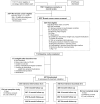Quality of life outcomes from the Exercise and Nutrition Enhance Recovery and Good Health for You (ENERGY)-randomized weight loss trial among breast cancer survivors
- PMID: 26518022
- PMCID: PMC4654570
- DOI: 10.1007/s10549-015-3627-5
Quality of life outcomes from the Exercise and Nutrition Enhance Recovery and Good Health for You (ENERGY)-randomized weight loss trial among breast cancer survivors
Abstract
Obesity is a poor prognostic factor and is negatively related to quality of life (QOL) in breast cancer survivors. Exercise and Nutrition to Enhance Recovery and Good Health for You is the largest weight loss trial completed among cancer survivors. Percent losses in body weight with an intensive group-based intervention versus an attention control were 6.0 versus 1.5 % (p < 0.0001) and 3.7 versus 1.3 % (p < 0.0001) at 12 and 24 months, respectively. ENERGY also was designed to answer the research question: Does weight loss significantly improve vitality and physical function (key components of QOL)? 692 breast cancer survivors (BMI: 25-45 kg/m(2)) at 4 US sites were randomized to a year-long intensive intervention of 52 group sessions and telephone counseling contacts versus a non-intensive (control) of two in-person counseling sessions. Weight, self-reported QOL, and symptoms were measured semi-annually for two years. Significant decreases in physical function and increases in symptoms were observed among controls from baseline to 6 months, but not in the intervention arm, -3.45 (95 % Confidence Interval [CI] -6.10, -0.79, p = 0.0109) and 0.10 (95 %CI 0.04, 0.16, p = 0.0021), respectively. Improvements in vitality were seen in both arms but trended toward greater improvement in the intervention arm -2.72 (95 % CI -5.45, 0.01, p = 0.0508). These differences diminished over time; however, depressive symptoms increased in the intervention versus control arms and became significant at 24 months, -1.64 (95 % CI -3.13, -0.15, p = 0.0308). Increased QOL has been reported in shorter term diet and exercise trials among cancer survivors. These longer term data suggest that diet and exercise interventions improve some aspects of QOL, but these benefits may diminish over time.
Keywords: Breast cancer; Obesity; Physical function; Quality of life; Symptoms; Weight loss.
Conflict of interest statement
Figures


References
-
- Hopman WM, Berger C, Joseph L, Barr SI, Gao Y, Prior JC, Poliquin S, Towheed T, Anastassiades T. The association between body mass index and health-related quality of life: data from CaMos, a stratified population study. Qual Life Tes. 2007;16:1595–1603. - PubMed
-
- Imayama I, Alfano CM, Neuhouser ML, George SM, Wilder Smith A, Baumgartner RN, Baumgartner KB, Bernstein L, Wang CY, Duggan C, et al. Weight, inflammation, cancer-related symptoms and health related quality of life among breast cancer survivors. Breast Cancer Res Treat. 2013;140:159–176. - PMC - PubMed
-
- Morey MC, Snyder DC, Sloane R, Cohen HJ, Peterson B, Hart-man TJ, Miller P, Mitchell DC, Demark-Wahnefried W. Effects of home-based diet and exercise on functional outcomes among older, overweight long-term cancer survivors: RENEW: a randomized controlled trial. JAMA. 2009;301:1883–1891. - PMC - PubMed
-
- Demark-Wahnefried W, Winer EP, Rimer BK. Why women gain weight with adjuvant chemotherapy for breast cancer. J Clin Oncol. 1993;11:1418–1429. - PubMed
Publication types
MeSH terms
Grants and funding
LinkOut - more resources
Full Text Sources
Other Literature Sources
Medical

